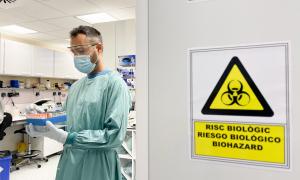Self-sampling to diagnose mpox in asymptomatic individuals, a useful strategy to improve outbreak prevention and control

An article published in Nature Communications on the pilot study conducted in Catalonia to evaluate the self-collection of biological samples reveals the high acceptability of the proposal and the key role of diagnosis in people without mpox symptoms
In July 2022, the World Health Organization (WHO) declared the outbreak of mpox a Public Health Emergency of International Concern. Given the increase in the number of people affected by this zoonotic virus (transmissible from animals to humans), the scientific community has launched several studies with the aim of curbing the spread of the infection among the population. As a result of this context, the Nature Communications journal, one of the most prestigious in the field of science, has published this Monday, October 2, the article "Self-sampling monkeypox virus testing in high-risk populations, asymptomatic or with unrecognized monkeypox in Spain", a study designed and implemented by professionals from the Center for Epidemiological Studies on Sexually Transmitted Infections and AIDS of Catalonia (CEEISCAT) with the collaboration of IrsiCaixa and the Department of Microbiology of the Clinical Laboratory of the North Metropolitan Area - Germans Trias i Pujol Hospital (Can Ruti Campus), which demonstrates the importance of self-sampling when diagnosing asymptomatic cases or those without the typical symptoms of mpox.
The project, called "Stop mpox", has been led by Dr. Cristina Agustí and Dr. Jordi Casabona from CEEISCAT, a research group of the Germans Trias i Pujol Research Institute (IGTP), and has evaluated a screening strategy for the mpox virus through the self-collection of biological samples among gays, bisexuals, other men who have sex with men and trans women, a group potentially exposed to this virus. The community-based association Stop has contributed to the field work of this study developed in Barcelona.
The intervention was designed in the context of the July 2022 outbreak of mpox –an infection usually transmitted by skin-to-skin contact during sexual activity– in which Spain was the third most affected country outside the African continent. Diagnosis is a key factor in containing the transmission of the virus, but many cases of infected people were not detected because of the lack of symptoms, or because these were not related to the infection. Therefore, the aim of the study was to describe the feasibility and acceptability of a community-based self-sampling strategy as a way to facilitate access to diagnosis and treatment of asymptomatic or unrecognized mildly symptomatic individuals in the most at-risk exposed populations.
According to Cristina Agustí, the findings of the "Stop mpox" study show that limiting the test only to symptomatic individuals is insufficient to deal with possible outbreaks, as it excludes many others who could be infected and could transmit the virus. "Our intervention has been able to isolate viruses with replicative and infective capacity in the population studied. That is, even participants with no symptoms or low viral loads had viable viruses to infect others," she clarifies.
A total of 113 volunteers participated in the study, all recruited through the NGO Stop, who self-collected anal and pharyngeal samples. After laboratory analysis, all participants were informed of their diagnosis and those who tested positive were asked about the occurrence of symptoms within three weeks of the mpox-positive result. There were seven positive cases, with three reporting no symptoms and three reporting a non-specific clinical profile of the virus. "In order to confirm or rule out the positive cases, we performed PCR tests on the genetic material of the biological samples," explains study author and IrsiCaixa principal investigator Nuria Izquierdo-Useros. "The samples that tested positive were subjected to a second test that analyzed the ability of the detected viruses to infect cells in culture. This infectious capacity reflects their potential to be transmissible to other people," she adds.
The prevalence of infection estimated from the study was 6.19%. The participants were also surveyed on their satisfaction with the self-sampling methodology, certifying a high degree of acceptance due to its ease and efficacy.
The project, which is part of the Public Health and Primary Care Research Program of the IGTP, makes use of the experience of CEEISCAT, in collaboration with IrsiCaixa and Microbiology of the Germans Trias i Pujol Hospital, in the approach and evaluation of diagnostic strategies outside formal health care settings for different infectious agents, which its director, Dr. Jordi Casabona, values as "an essential piece for the control of emerging and re-emerging infections that we can face in the future". Researchers believe that the results of the research may contribute to improve prevention and control policies against possible new outbreaks of this infection, suggesting the need to facilitate diagnostic tests to all potentially exposed persons, regardless of their clinical symptoms.